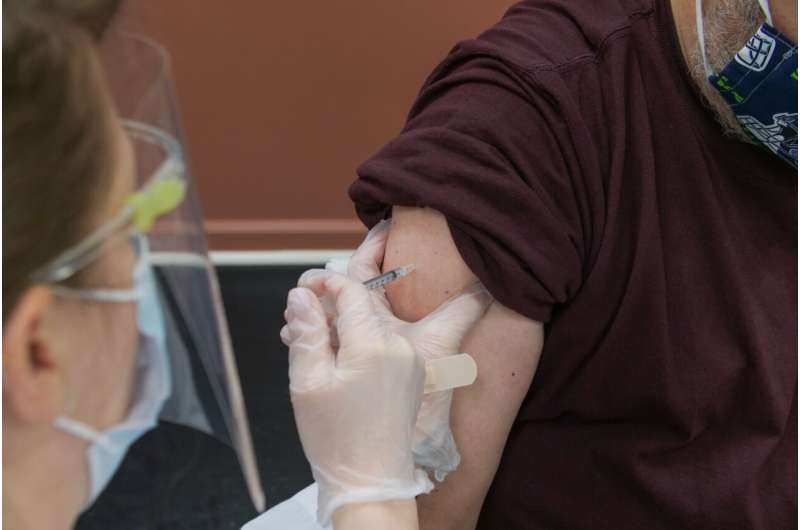Global trial demonstrates some benefits of flu shots for heart failure patients

People with heart failure who received an annual flu shot had lower rates of pneumonia and hospitalization on a year-round basis and a reduction in major cardiovascular events during peak flu season, in a study presented at the American College of Cardiology's 71st Annual Scientific Session. However, the trial did not meet its primary endpoint as patients who received the flu vaccine showed no significant reduction in rates of major cardiovascular events on a year-round basis during the study's three-year follow-up period.
The study is the first randomized controlled trial to assess the benefits of the flu vaccine specifically in people with heart failure, who face a high risk of cardiovascular events. It was conducted in countries across Asia, Africa and the Middle East where getting a flu shot is not routine for most people. The trial did not meet its primary or co-primary endpoints, which focused on the rate of major cardiovascular events analyzed on a year-round basis. A prespecified sub-analysis of the data revealed that people who received a flu shot showed a significant reduction in cardiovascular events during periods of the year when rates of influenza were highest.
"Although our prespecified endpoints were not significant, our data suggest that there's a clinical benefit [to getting a flu shot] given the clear reduction in pneumonia, moderate reduction in hospitalization and reduction in vascular events and deaths during periods of peak influenza," said Mark Loeb, MD, Michael G. DeGroote chair in infectious diseases at McMaster University in Ontario, Canada, and the study's lead author. "When taken together with previous trials and observational studies, the collective data demonstrate there is a substantial benefit to receiving a flu vaccine for people with heart failure."
Heart failure is a condition in which the heart becomes too weak or stiff to pump blood effectively. Previous studies have shown that people with heart disease or cardiovascular risk factors face an elevated risk of complications when they contract influenza, but there has been a lack of evidence on whether flu vaccines can help to mitigate this risk specifically in people with heart failure.
The trial enrolled 5,129 patients with heart failure in 10 countries where flu vaccines are not common. Participants did not routinely get flu shots and had previously received a flu shot no more than once during the three years preceding the trial. Participants were randomly assigned to receive a flu shot or a placebo annually for up to three years, though they were also allowed to get a flu shot outside of the trial. Researchers tracked health outcomes for a median of 2.9 years. The trial's primary endpoint was a composite of death from cardiovascular causes, non-fatal heart attack or non-fatal stroke. Its co-primary endpoint included a composite of any of these events plus hospitalization for heart failure.
Overall, the composite primary endpoint occurred in 691 participants and 1,470 experienced the composite co-primary endpoint. When analyzed on a year-round basis there was no significant difference in the rates of these events between those who had received a flu vaccine and those who had not.
However, separate analyses of hospitalization, pneumonia and other respiratory outcomes found that rates of pneumonia were 42% lower and hospitalizations were 15% lower among those who received a flu shot.
Researchers also found a significant reduction in the first primary endpoint—as well as reductions in all-cause death and cardiovascular death—in favor of the flu vaccine when the analysis was limited to periods of peak influenza circulation. In contrast, there was no significant difference in these endpoints between groups during periods of the year when influenza circulation was low.
Based on these results, researchers said the flu vaccine did help to protect patients from influenza complications, including cardiovascular events.
"Many of the effects we found during peak flu circulation disappeared outside of it," Loeb said. "There's no biological explanation for that other than influenza infections."
While influenza circulation tends to rise and fall throughout the year, peaks do not always occur at the same time each year in places close to the equator the way they do in places that have marked temperature changes between winter and summer, such as the U.S. Because many of the countries included in the study lack active disease surveillance systems, researchers used the best evidence available to determine when the peak period of influenza circulation occurred in each location.
While the study was conducted in countries where the flu vaccine is either not widely available or not common to receive, Loeb said the results could likely be generalizable even in Western countries where flu vaccine uptake is higher. Study participants were allowed to get a flu vaccine outside of the study, but Loeb said that only a very small fraction did, so this likely had no effect on the study findings. He added that the study was stopped early in four countries due to the COVID-19 pandemic.
Loeb said that additional trials and large-scale observational studies could further clarify the health benefits of influenza vaccination in people with cardiovascular disease.
"I think this study offers an important message about vaccines generally—that it is important to do randomized controlled trials in populations that historically haven't had a very high uptake of vaccines," Loeb said. "These types of [research] gaps have to be filled."
More information: Mark Loeb, Salim Yusuf et al, Randomized Controlled Trial Of Influenza Vaccine In Patients With Heart Failure To Reduce Adverse Vascular Events, American College of Cardiology 71st Annual Scientific Session, April 3, 2022



















